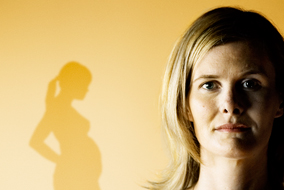
Graduate student Genevieve Creighton found surprising moral overtones in health literature about teen mothers - photo by Martin Dee / Ann Gonçalves UBC Reports | Vol. 53 | No. 7 | Jul 5, 2007
Damaged Goods?
Health system stereotypes still exist for teen mums
By Hilary Thomson
Stigmatized or supported? How do teen mums fare in the health-care system?
Educational Studies and Health Promotion graduate student Genevieve Creighton wants to find out.
In a master’s thesis project, Creighton reviewed and analyzed newsletters, Canadian public-health magazine articles and journals that discussed teen pregnancy and motherhood to find out how teen mums are characterized in public health literature and practice. Terms such as “babies having babies” and “sexually unrestrained” are common, she says.
“I was surprised by the moral tenor that still exists,” she says. “Despite relatively progressive government health policies about youth and sexuality, teen mothers are still stereotyped as emotionally and socially lost or damaged girls and poor mothers.”
The average number of teens who give birth in Canada is 42 out of every 1,000 with Aboriginal teens becoming mothers at 18 times this rate, according to research published in 2005.
“There are lots of blaming messages out there for teen mothers,” says Creighton. She found that mothers who didn’t take health-care providers’ advice on issues such as diet, substance use and exercise were characterized as immature and contrary.
Creighton’s interest in the issue developed when she worked for two-and-a-half years in a neighbourhood house in Surrey, B.C. She set up an educational and health-care program for young mothers whose situation did not match eligibility criteria, such as the age or number of children, for similar programs offered by the school district.
“My experience of these women was very different from the common perception found in many helping agencies,” says the 34-year-old. “I found many of these mums to be strong, dedicated individuals who wanted to be good mothers. For some, having a child turned their lives around and motivated them to create a better life for themselves and their baby.”
Her research showed that within the mainstream health-care system in Canada, adolescent mothers are characterized in academic health journals and nursing magazines that describe programs for young mothers, as poor decision-makers who risk their health and that of their child with the decision to continue their pregnancy. Stated risks included increased incidence of pre-and post-natal complications and increased risk of child abuse.
Creighton does not dispute the risks, but her research has led her to conclude that factors such as poverty, isolation and lack of social support are the causes, not the age of the mother.
“These attitudes can have a negative impact on the health of these women, because they are reluctant to seek health-care services for fear they will be judged and not treated with the same respect as other patients.”
A key problem, says Creighton, is a strong tendency to separate teen mothers from their social context when offering advice and care, and inadequate attention to the complexities of their lives. For example, health-care providers may focus on quitting smoking without understanding that smoking may be the woman’s sole stress reliever in a demanding and socially complicated situation.
Models of enlightened and empowering relationships between health-care providers and young mothers do exist here in Canada, says Creighton, but are more commonly found in countries such as the Netherlands and Sweden where attitudes toward sex education and adolescent sexuality don’t carry the moral overtones found in Canada.
What do teen mothers need?
“They need the same things that make life better for all mums and kids – social and financial support, child care, and good nutrition,” says Creighton.
She is concerned that progressive health-care policies at the federal level can be over-ridden at the community level. Local communities and school boards can refuse to offer sex education or services of a public-health nurse in schools.
Creighton would like to see the women themselves creating and driving health-care and education programs that are meaningful for them, rather than having authorities impose programs. More and better programs for teen dads are also needed.
Starting a doctoral degree is the next step for Creighton. She will interview pregnancy clinic clients and health-care providers to assess how youth are treated and determine best practices. |
